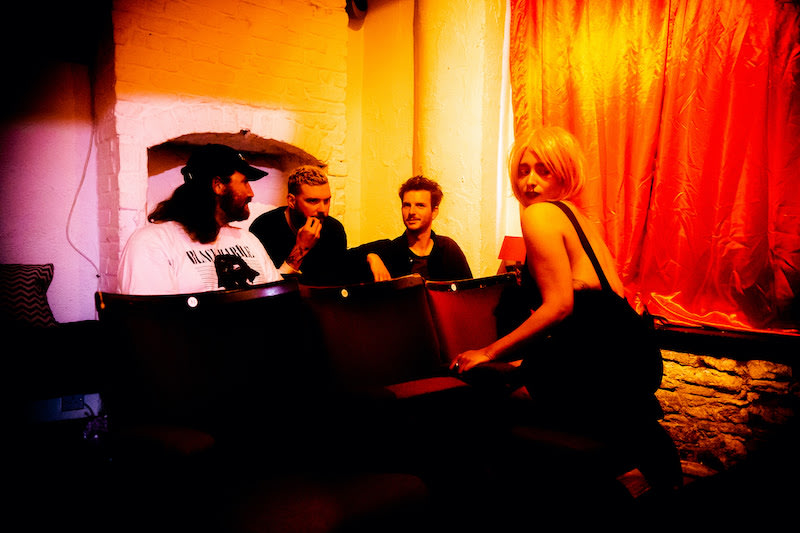 Harry Steel
Harry Steel
Mandy, Indiana are often described as a Manchester band, but in reality, their links to the city are loose. “I left for a reason,” the band’s co-founder Valentine Caulfield says from her native France, “because I fucking hate it.” She speaks with the same withering tone that makes her band, co-founded with Scott Fair, so bracing to listen to (Fair also feels little kinship with Manchester beyond personal ties, and has also left it behind). The band’s dismissal of the English city they formed in is just a taste of the barely concealed rage simmering on their debut album i’ve seen a way, released last month.
Caulfield is a fascinating vocal presence in Mandy, Indiana. She sings in her native French and often uses her voice more as a texture than a messaging service. Her shrieks pierce a song like “Peach Fuzz” just as much as the synth player Simon Catling or Alex MacDougall’s relentless drumming. Her voice may be presented as part of the ensemble, but at key moments there is no masking of the lyrics. Album highlight “Drag [Crashed]” deals with everyday misogyny while elsewhere Caulfield speaks about the rise of fascist governments and the climate emergency with the same intensity of the music, a fusion of electronic and post-punk sounds. i’ve seen a way reflects an oppressive world back at itself while also pointing towards a more positive future.
The idea of revolution is at the core of album centerpiece “2 Stripe,” a reverb and drone-heavy pit of sound that wonders whether widespread public revolt could ever happen in the U.K. Caulfield is doubtful, saying that, “The British people, for years, have just been rolling over and taking it all, and no one has done anything. Look, they've literally just banned the right to protest so that a 74-year-old man who'd never had a job in his life could get an expensive hat. There's nothing British about revolution. She’s equally scornful of the situation back home, despite recent protests against President Macron’s decision to raise the age of legal retirement to 64. “All of Europe is fucked,” she says with deep scorn.
Speaking in the run-up to the release of i’ve seen a way, Caulfield and Fair discussed the themes of the album as well as some of the unconventional ways in which it was made
The FADER: Parts of i’ve seen a way were recorded in unusual places such as a cave and a shopping center. What made you want to get out of the studio and go into those environments to record?
Scott Fair: It's just exciting, I think, and imparts something that is unique to us. We did a little bit of research and tried to make sure it wasn't somewhere that a load of bands had gone to record before. So as far as we're aware, the locations we chose were kind of unique to us. We were recording it while writing it as well, so the spaces were kind of informing the writing.
I've spent a lot of time in studios. I did a music production degree, so I was kind of in and out of studios all the time, and I just found those environments to not really fuel me creatively. So I wanted to go somewhere that was going to make me excited.
Was there any kind of pushback when you said, "Yeah, we want to spend some of this advance going to a cave in the West country or a shopping center in Bristol"?
Scott Fair: No, there wasn't really any resistance or pushback. I think maybe they were a little bit... there was a bit of a gulp, but I suppose we were a bit like that as well, because we didn't know how it was going to turn out. It could have easily not worked.
Valentine Caulfield: Imagine spending 90% of the budget on taking everything to a fucking cave for it to just not work out.
And to what extent are the public a factor when you're doing this kind of stuff? Are you getting interrupted by people or getting on people's nerves? Or are you able to carve out a space where it's a bit more private?
Scott Fair: We weren't supposed to be interrupted, but we were. But I think that's cool as well because we're not precious when it comes to things like fidelity or really clean, isolated recordings. It's kind of nice when things happen in and around the stuff that's being recorded.There’s a lot of environmental sound on the album. Some of it is just recordings of people outside a club or something that's just underneath the track. And you can't even really hear it that well, but if you take it away, you notice. It's just a textural thing.
Did you record a lot of this stuff on phones?
Valentine Caulfield: With the shopping center in Bristol we were just walking through it with our friends in SCALPING and they were saying to us that there's a spot in it that has amazing reverbs. So we all kind of stood there and everyone was clapping and stuff, and I just filmed myself shouting, and that's just a little bit of audio that ended up on “Peach Fuzz.”
Scott Fair: Yeah, there's that horrible auto-tune bit that is literally just a phone app. I love it. “The Driving Rain” has got this auto-tune effect on the vocal, too. I used this app called Voloco. I think it's mostly for people to make TikTok videos in the style of rappers or something but it has a preset that just sounded ace.
Valentine, I wanted to speak to you about your lyrics and the tension and a lot of the frustration that I think comes through on the album. “Pinking Shears,” for example, references to the migrant crisis. These feel like they come from a very British place, or at least from someone who has lived in the U.K. these past few years.
Valentine Caulfield: I think a lot of the things that I talk about on the album are things that are true all over. I complain a lot about the U.K. but the situation isn't that much better over here. There's a line in ‘Pinking Shears’ that basically says, "We pick the people we let in, we only let the blonde ones in, and the ones that we bomb, we just let die."
And that was very much a reference to the Ukrainian crisis, where obviously when Ukraine was invaded by Russia, all neighboring European countries opened their doors wide to take in Ukrainian refugees, as they fucking should, but look how fucking [U.K. Home Secretary] Suella Braverman talks about migrants coming on small boats. And those are the people whose countries we have destroyed.
The thing is, that's the case all over Europe. So those things obviously come from a place of looking at what's going on in the U.K.. It also comes from a place of looking at what's going on in France. Because as a woman of color, seeing that fucking Ukrainian crisis and hearing journalists say, "Well, but we do feel worse about them because they look like us," when I'm a French woman who was born in Paris, but who is a woman of color, I find that absolutely revolting.
I was curious, with you singing in French, and having these messages that you're very passionate about and things that you believe very strongly in, did it ever bother you that the audience when you were playing in Manchester and in the U.K. maybe wouldn't understand and wouldn't be hearing what you've got to say?
Valentine Caulfield: I mean, I think it's definitely something that we were aware was going to be an issue. But I think having grown up in France, I had to work to understand the music that I liked. Because I grew up with mostly English-speaking music, and that didn't stop me wanting to understand what was going on, and that didn't stop me from understanding even without necessarily understanding the lyrics, some of the intention behind it.
So I think it's interesting to me to first of all try and use my emotions in a way that hopefully will impart some of the meaning on the people who come and see us or listen to the album, even without them necessarily understanding French. I also think that if you really like something and you want to know what it's about, Google is right there.
I saw a tweet of yours recently where you were joking about a song of yours written about beheading royalty. Which track on the album is that?
Valentine Caulfield: “2 Stripe,” it's one of my favorites on the album. It's written like a fairytale and I deliver it like I’m reading to a child. It’s about a little servant who works in a big castle, and obviously all the servants are really poor and really hungry and really cold, and the king and the queen and their children and the important people at the court all live these beautiful, luxurious lives. And then all the servants realize that they are more numerous than the good people, and they just behead everyone and take over.
So I'm guessing you didn't watch the Coronation recently?
Valentine Caulfield: No. Sorry. I feel like considering how many people in the UK die of either starvation or cold in their homes, maybe pissing up 250 million so that King Tampon can have his big hat wasn't a necessity.
When you first came out, you were called Gary, Indiana. Right? I'm not imagining this? What was the reason for the name change?
Scott Fair: We got a U.S. label, and they were like, "Nope."
What was the problem?
Scott Fair: They were just, like, don't name yourselves after a city in Indiana. And we were like, but Gary's a really common name in the U.K., so it's funny. They're just like, they won't get it in the States.
I like Gary, Indiana. I think that's a fun name.
Scott Fair: Well, that's it. Everybody in the U.K. was into it and they understood it, but as soon as you get outside of the U.K., people are just like, why are you called that?
It's kind of fortunate that we did end up signing with the U.S. label and made that change early on instead of much further along the road, because I don't think we ever would've thought that it would've been an issue. But as soon as they got involved, they were just like, "Job one, change the name."
